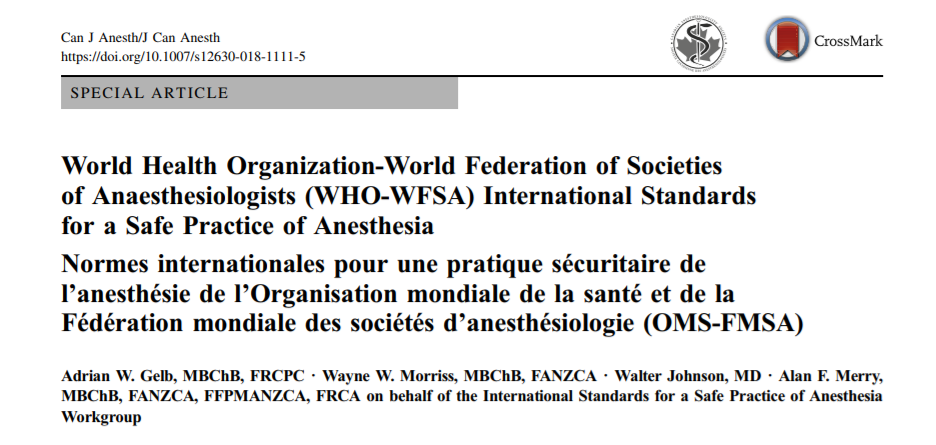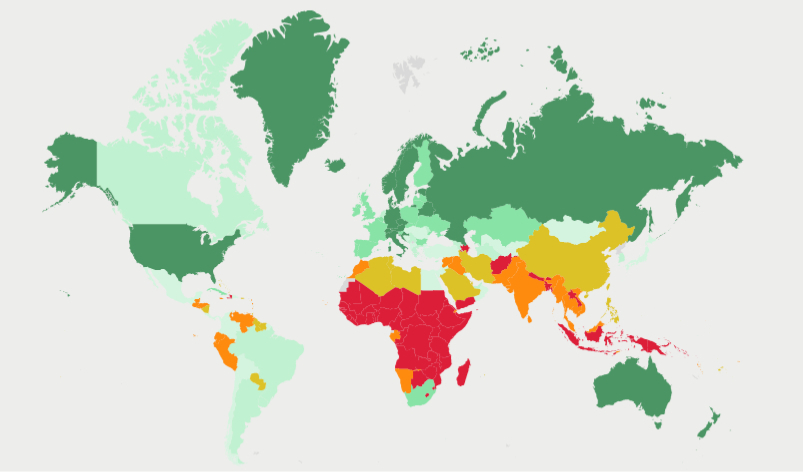WFSA’s Guiding Pillars
The WFSA has developed three pillars that guide the organisation’s advocacy work in order to achieve its overall mission to improve patient care, and access to safe anaesthesia by uniting anaesthesiologists around the world: Unity, Access and Safety.
Access
Workforce
The WFSA Global Workforce Map shows data for countries representing more than 7 billion people, highlights the huge shortage in anaesthesia workforce worldwide and also highlights the gap between the rich and poor. Using current population data, over 136,000 additional physician anaesthesia providers are needed immediately to achieve a minimum density of 5 per 100,000 population in all countries, highlighting the current crisis in surgical and anaesthesia workforce density.
The WFSA conducted a global workforce survey during 2015-2016, sending member societies a list of information required and a link to an online survey, as well as collecting information from anaesthesiologists during international conferences and contacting anaesthesia providers working in non-WFSA-member countries.
Further reading
Universal Health Coverage (UHC)
The WFSA Global Position Statement on Anaesthesiology and Universal Health Coverage was approved by the General Assembly in 2017. This provides guidance around the current anaesthesia and surgical crisis within the global health policy agenda that seeks to achieve UHC.
The WFSA position statement highlights the need for WFSA and anaesthesiologist leadership in addressing the human resource crisis in anaesthesia, as well as acknowledging the important role of non-physician providers in some contexts and in relation to the goal of Universal Health Coverage by 2030.
National surgical, obstetric and anaesthesia plans (NSOAP)
WFSA works with its member societies to strengthen national health systems. In partnership with its members, WFSA engages with national governments to advocate for the commitment of resources to improve the availability, accessibility, acceptability and quality of anaesthesia and surgery at country and local levels.
WFSA works with member societies to develop National Surgery, Obstetric and Anaesthesia Plans (NSOAPs) which can be integrated into national health policy, to help engage governments and the wider medical community.
The WFSA is also able to assist our member societies in compiling a National Anaesthesia Plan and can help engage governments, Ministries of Health, and the wider medical community in the importance of a National Anaesthesia Plan for public health as a whole. To find out more about the assistance we can offer please email advocacy@wfsahq.org.
Safety
Safe Anaesthesia
Scaling-up anaesthesia resources will not improve patient outcomes alone. It is essential that safe practices are followed internationally to ensure the best possible care which is why safety remains at the heart of our advocacy efforts.

The WHO-WFSA International Standards for a Safe Practice of Anaesthesia were first published in June 1992. These have been revised periodically and the latest version (May 2018) is, for the first time, published jointly with the World Health Organisation. The standards are particularly needed in areas with complicated realities, where a commitment to safety in anaesthesia is absolutely essential in order to improve access to safe surgery, to save lives and to strengthen health systems. To find out more about the Standards and view the accompanying checklist in several languages please click here.
Unity
Anaesthesia Facility Assessment Tool (AFATs)
WFSA supports regional and national anaesthesia and health care leaders to gather data about anaesthesia workforce, equipment, medicines and practice at the facility level through the Anaesthesia Facility Assessment Tool (AFAT).
If you would prefer to complete the questionnaire in Microsoft Word, please download it here and send it back to programmes@wfsahq.org.






